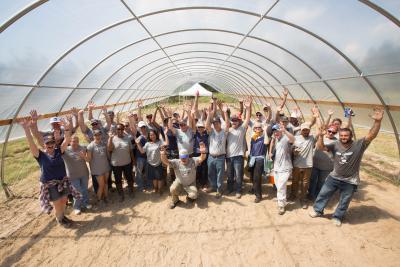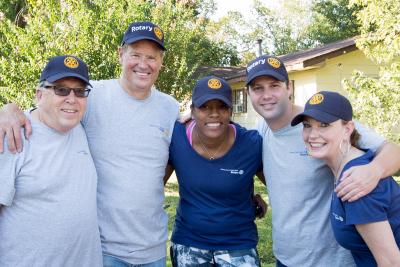A collaboration between Rotary and Heifer continues to produce big results, helping small farms provide healthier, locally-sourced food
In the fall of 2015, volunteers from Rotary and Heifer International came together to build hoop houses for a few farmers working small lots in Arkansas, USA. The afternoon outing was part of a larger project that is still reaping benefits four years later, supporting small-scale agriculture in the region and increasing access to locally-grown food.
Heifer has been using the small-scale agriculture model for decades to alleviate hunger and fight poverty around the world. The approach has the added benefits of being environmentally friendly and offering healthier food options.
That mission dovetails with Rotary’s mission to grow local economies and improve health. So it’s not surprising the two groups have teamed up on a number of occasions in the past 30 years to improve communities by helping families escape poverty. Several Heifer employees are or have been members of the Rotary Club of Little Rock, Arkansas, USA, the city where Heifer has its headquarters.
“Our values line up very well,” says Ardyth Neill, a member of the Little Rock club and president of the Heifer Foundation. “With Rotary, it’s Service Above Self and helping to serve others. Heifer has been working with farmers to be accountable, pass on their gifts, train other farmers, and work together in community. It’s learning to share and care, basic things that work well together.”
Sustainability
In the United States and other developed nations, a lot of food production is controlled by large industrial operations, which produce cheaper food by focusing on a single crop and using specialized equipment to cut labor costs.
But according to research into sustainable agriculture, this food model has downsides, including a reliance on commercial fertilizers, heavy pesticides, and other chemicals that can harm the environment.
The trend has also contributed to the failure of smaller family farms, increasing the poverty rates in places like rural Arkansas.
Nationwide distribution networks have also resulted in food deserts in urban areas, particularly in the U.S., England, and Australia, where poor neighborhoods have little access to fresh produce and instead rely on less nutritious fast foods and packaged products.
Small-scale sustainable agriculture, on the other hand, tends to keep things local. The money you spend on food stays in your community and helps your neighbor. Farmers maximize land use by planting multiple crops that replenish the soil and reduce the need for fertilizers and pesticides.
And fruits and vegetables grown closer to home keep more of their nutrients.
Consumers are increasingly aware of these health benefits, fueling the market for local produce.
“There’s a phenomenon going on, really nationwide, about people becoming more and more concerned and thoughtful about where their food comes from,” says Sharon Vogelpohl, a past president of the Little Rock Rotary club and a volunteer on the project.
In Heifer’s back yard
Before teaming up with Rotary on the project, Heifer USA conducted a study that found considerable untapped demand for locally grown produce. The study calculated that Arkansas spends more than $7 billion a year on food, with about $6.3 billion of that coming from outside Arkansas.
Heifer set up a Community Supported Agriculture (CSA) network — a food subscription service in which consumers buy produce in advance at a fixed price, guaranteeing farmers a market for their crop regardless of how weather or other factors may affect their output.
Rotary members used their extensive contacts to find buyers for the CSA shares, and offered business and planning advice to the farmers. Heifer provided training in sustainable practices and taught its philosophy of accountability, sharing, passing on training, and self-reliance.
Through its first five years, the number of shares sold grew from 150 the first year to more than 400 a year.
The New South Produce Cooperative became a largely independent cooperative in 2016, and in 2017 expanded to wholesale markets. Now, Heifer USA is transitioning oversight of the program to one of its funding partners, 275 Food Project, smoothing the path for expansion into the Memphis area.
"We’ve always viewed our role as being an incubator of this project,” says Annie Bergman, Global Communications Director for Heifer. “This will allow growth across the border and provide more support for the farmers. We will still offer training and funds when needed."
Farming around the world
The tools of small-scale sustainable agriculture look different around the world, but the principles are the same. Noel Mace, Heifer International’s program manager for Africa, explains that cooperatives play a crucial role in bringing together groups of farmers — many with both livestock and crops — and connecting them to markets.
“We are now developing more of a market-driven approach,” says Mace. “Historically, Heifer has spent a lot of time on how to bring poor farmers to a subsistence level where they can feed their families. But our mission is to end hunger and poverty, not to lessen it. Poverty is a big challenge without connecting to markets.”


Volunteers from the Rotary Club of Little Rock, Arkansas, USA, and Heifer built a high tunnel for Joe Carr.
“So the question,” he continues, “is not just how do we make sure you are not hungry, but how do we move you beyond a family-level production to participating with others in a market” that creates income and increases livelihood?
Africa has a strong dairy program, so much of Heifer’s work there flows out of milk. Tight groups of 15 to 20 farmers join with other groups in cooperatives that then have enough scale to access chilling plants and, ultimately, processing plants. The farmers then look to diversify further by using their milk co-op to sell avocados, lettuce, tomatoes, and other produce.
“If I am a consumer, I now can go to the co-op and buy milk, but also buy fresh fruits and greens, and I know it will have the same level of quality,” says Mace. “It’s really about marketing a brand, something I can rely on and know they will have when I go there.”
Spreading success
Back in Arkansas, Ben Wihebrink of Heifer USA says the larger vision is to encourage others to copy their model. In addition to building support for the cooperative in Memphis, pilot efforts have been launched in northwest Arkansas and the Arkansas Delta.
“There is an infinite demand across the (American) South specifically for local foods and organic foods,” says Wihebrink. “And as long as there is consumer interest, there is opportunity to help farmers in many places struggling to make a living.”
Joe Carr, recipient of one of the hoop houses, has been farming since he left his job at Whirlpool in 1987. He started a farmer’s market in 2003 that has grown to more than 60 vendors. The co-op and high tunnel (as it’s also called) have allowed him to increase his income.
"The beauty of the high tunnel is it gives you the quality you need for public demand,” he says. “Choy, kale, broccoli, carrots, and lettuce will all go through the winter. With the proper crop management, you can harvest all winter long."
• Read how Rotary First Harvest connects 'ugly' produce and food banks











